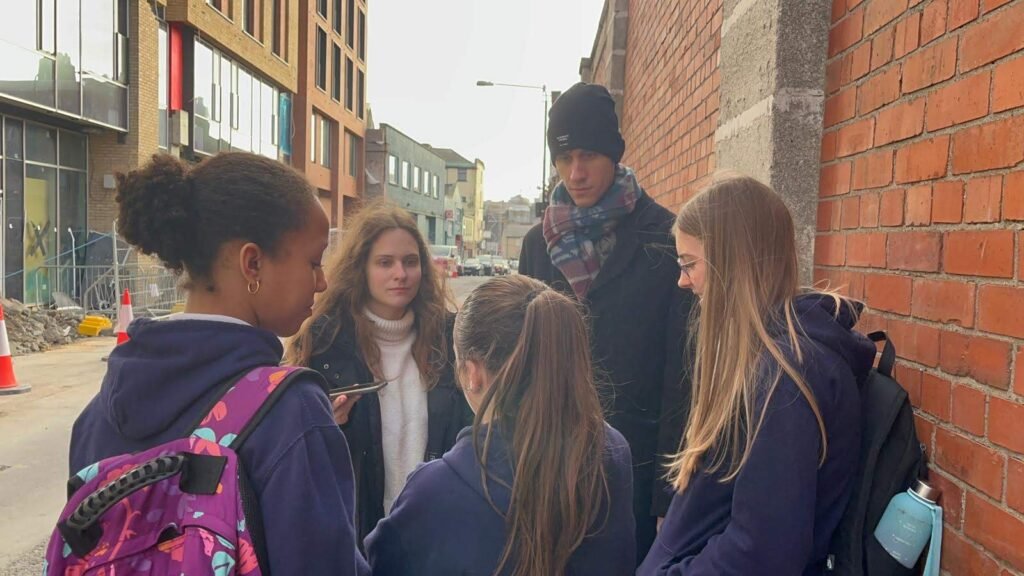We had the chance to chat with a few young people in Ireland and was fascinated by their perspectives on media literacy education. This blogpost contains the summary of 3 interviews conducted under 2 days in Dublin, Ireland.
Early and Consistent Integration
The Irish students mentioned having some exposure to media literacy concepts even in middle school. It seems it was woven into core classes like history and English, which is an excellent tactic. Instead of isolating media literacy as a separate subject, Ireland appears to embed it organically alongside other vital skills such as research and information evaluation.
Focus on the Online World
Our conversation highlights the importance of teaching students how to navigate online environments safely and effectively. Issues like cyberbullying and online misinformation demand attention. It’s essential to introduce students to the complexities and potential dangers of the digital landscape throughout their education.
Mandatory Education
One student commented that they had a mandatory class on media literacy in school. Although Hungary does integrate some media literacy into the curriculum, considering a more formalized course structure (especially when the internet plays such a dominant role) could prove enormously beneficial. This ensures that all students reach a baseline level of awareness and competency.

Dublin, 2024. 01. 24.
Trust, Source Choice, and the Need for Verification
It was interesting to hear that the students trust news that aligns with what they hear from friends and family, regardless of where the original information came from. They also admitted relying on social media platforms – not ideal if you’re aiming for reliable, well-rounded news. Additionally, the concept of cross-checking information across multiple sources came up thanks to prompting rather than being top-of-mind. While highlighting some concerning gaps, this interview offers points for Hungary to prioritize:
Focus on Social Media
Given how influential social media is for young people, addressing how they navigate that space within media literacy lessons is essential. Help them learn how to recognize misinformation and how algorithms distort perspectives.
Beyond “Spotting Fakes”
Media literacy extends beyond identifying false narratives. Students also need to understand things like propaganda techniques, biases within publications, and the nuances of news reporting.
Promote “Healthy Skepticism”
We don’t need a cynical generation. The goal is empowering students to actively question and evaluate the information they encounter, without falling victim to paranoia or complete doubt.

Dublin, 2024. 01. 25.
We interviewed other students too. These students showcased a clear understanding of what media literacy truly entails. They emphasize a critical stance and not blindly trusting what they read. Their answers reveal a grasp of things like source credibility, potential biases, and the influence of social media algorithms. This indicates positive awareness of the complexities in the media landscape.
These students describe themselves as generally media literate, even with the growing presence of online platforms like Twitter in their information diet. This level of self-awareness and their nuanced understanding of how algorithms shape online exchanges provides a strong foundation for fostering even better media literacy skills.
From this interview we got the following take-away points:
Critical Thinking is Key
Media literacy depends on this core skill. It allows you to question the motives behind certain stories or perspectives being presented. Helping students develop strong critical thinking makes them media-savvy.
Understanding Context and Tone
Students mention reading ‘between the lines’ and being open-minded about online information. It would be immensely helpful to focus on contextual awareness within media literacy teaching– recognizing bias, understanding how platforms curate content, and the complexities of interpreting information without visual cues.
Research and Source Credibility
While the students displayed instincts about sources, a focused education on reliable research methods and spotting red flags in articles/websites are valuable tools.
Knowledge about rights
We were shocked how deeply students were informed about their rights regarding media and that how they can be recorded, interviewed, etc. We of course obeyed the laws, but it was fascinating to learn about the knowledge of these students, which they claimed learned from ther parents and not in school.

Dublin, 2024. 01. 25.
We were told Irish laws don’t allow to post pictures where the face of the minor is recognizable.